Shrooms and Weed–Is One Better Than The Other?
Written By QuickMedCards. Reviewed by Dr. Shatha Atiya, PsyD. Updated May 13, 2025
Although shrooms and weed are very different drugs, their alleged health benefits are similar. But that’s not all–some shroom enthusiasts believe the fungi could even replace cannabis as complementary medicine.
By the end of this page, you will have the answers to these questions:
- Which one is better, shrooms or weed?
- What do shrooms and weed have in common, and what are the differences?
- What are the benefits of magic mushrooms and weed?
So, shrooms or weed? A head-to-head between the two should suffice to see which plant comes out on top.
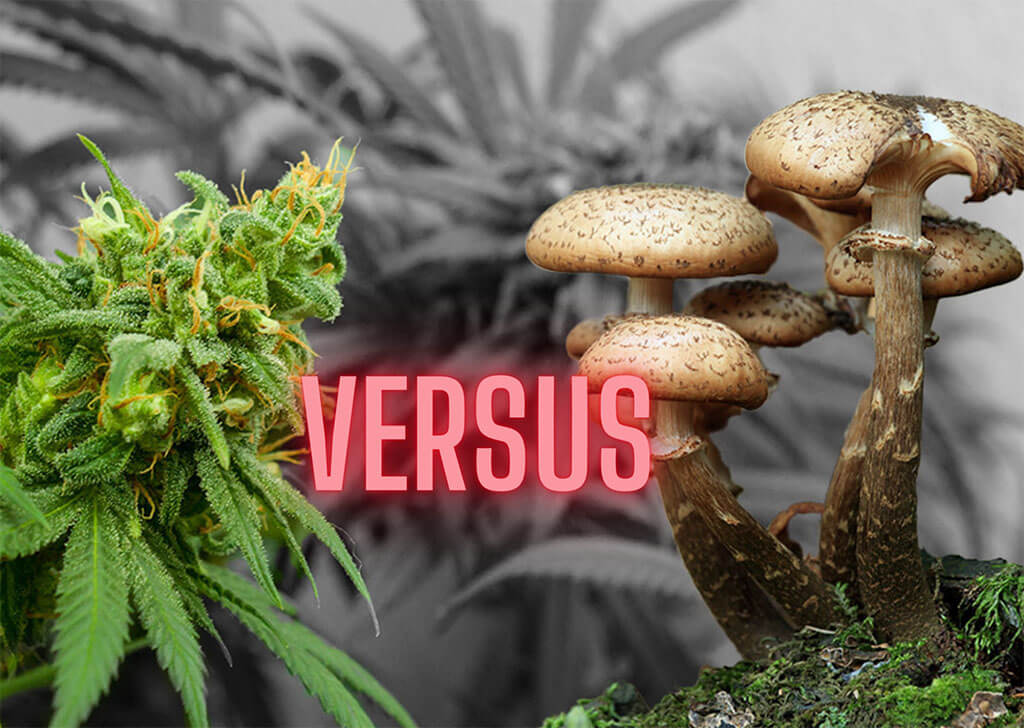
Looking for a Medical Marijuana Doctor?
Shrooms and weed have a long history of use among various cultures. More recently, attitudes towards the two are changing. No longer do they only serve as hippie pastimes. Instead, modern science is demystifying the mystery shrouded in these two plants and revealing their therapeutic benefits. Today, more and more people are turning to dried shrooms and weed as alternative medicines to pick up the slack for modern therapies.
What are shrooms?
Shrooms, magic mushrooms, psychedelic mushrooms, trippy mushrooms, Psilocybe cubensis–whatever you want to call them, are a type of fungus that contains the psychoactive compound psilocybin.
Psilocybin is a naturally occurring psychedelic drug that produces powerful hallucinations and can alter your perception of time and space. People have used shrooms for centuries for religious and spiritual purposes. In recent years, shrooms have become increasingly popular as recreational drugs.
People use shrooms for all sorts of reasons. For instance, to relax, experience new things, connect with nature, or even have a good time. And today, some people are using it to treat conditions such as depression and anxiety.
Beyond shrooms, there are also mushrooms like amanita muscaria. These do not contain psilocybin and their hallucinogenic effects are explained by such components as muscimol and ibotenic acid.
Types of psychedelic mushrooms
Besides psilocybin, psychedelic mushrooms contain other natural hallucinogens, for example, psilocin and baeocystin. The most well-known psychedelic mushrooms are the
- Psilocybe cubensis, the most potent variety,
- and the Psilocybe semilanceata, also known as liberty caps.
What is weed?… Really?
Weed, pot, cannabis, or marijuana, is a plant like any other. That has been used for millennia for various purposes; medicinally, recreationally, and industrially.
Its strong fibers made rope and sails, and its oily seeds were a source of food and fuel. Today, cannabis is best known as a recreational drug. However, it also has a range of potential medical applications.
Cannabis contains a chemical called THC that binds to receptors in the brain, causing the user to feel high. THC is also responsible for other effects of cannabis, such as increased appetite and relaxation.
In recent years, weed has become increasingly popular as a source of medical treatment. As it happens, in states where medical weed is legal, an MMJ doctor can recommend it for conditions such as chronic pain, anxiety, and migraines.
When it comes to variety, weed abounds. Dispensaries nationwide stock strains of Sativa, Indica, and hybrids, for instance, Purple Kush, Sour Diesel, Girl Scout Cookies, and Sweet Tea.
What do shrooms and weed have in common?
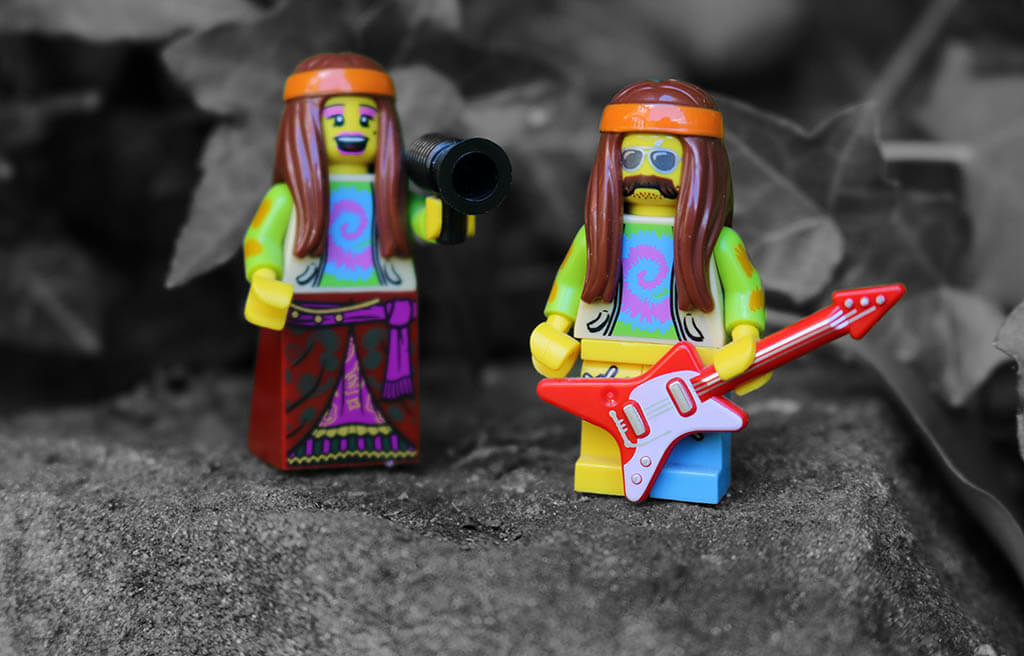
Before pitting shrooms and weed against each other, let’s see where they share common ground.
- First, shrooms and weed are popular recreational drugs often used for their psychoactive effects.
- Both substances can cause users to feel euphoric and relaxed,
- and they can also alter perception plus cause visual and auditory hallucinations.
- Shrooms and weed have a long history of use in traditional medicine,
- and research on their potential therapeutic benefits continues.
- Both drugs are relatively safe when used responsibly,
- but they can be dangerous if used excessively or in combination with other substances.
With that out of the way, we can get to the crux of the matter; shrooms versus weed.
Magic mushrooms benefits VS weed benefits
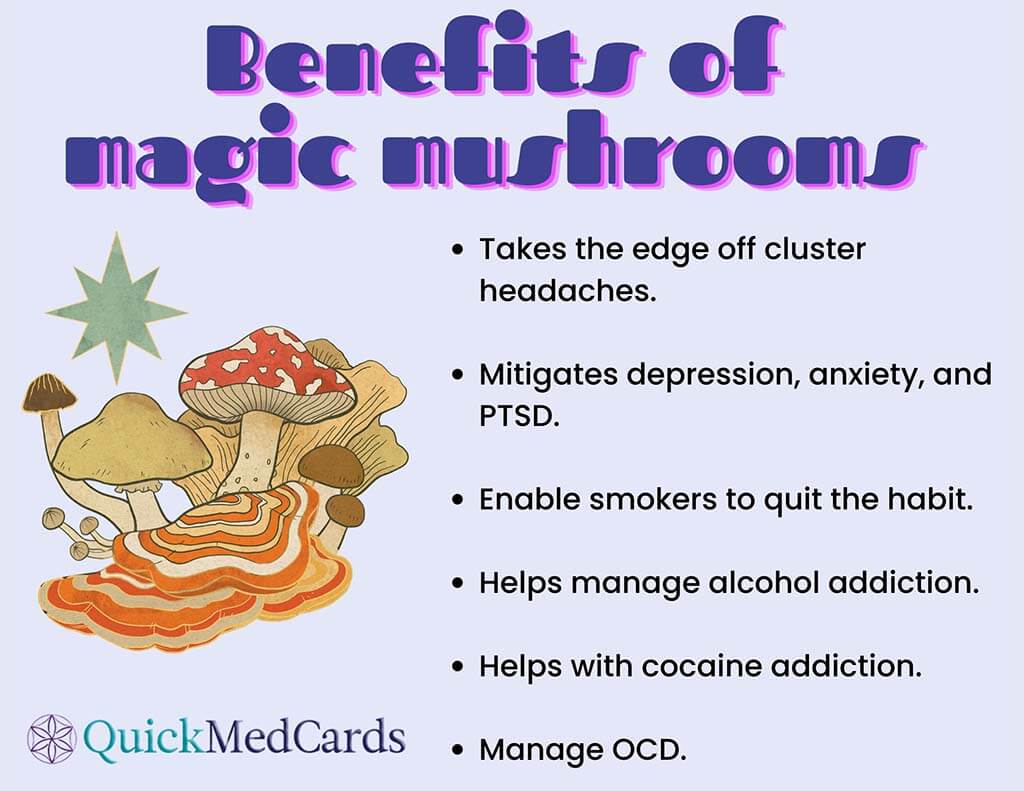
Though magic mushrooms have existed for centuries in shamanic rituals, western science is only now beginning to understand their healing potential. Recent studies and anecdotal reports suggest that magic mushrooms may:
- Alleviate cluster headaches.
- Ease depression, anxiety, and PTSD.
- Enable smokers to quit the habit.
- Help manage alcohol addiction.
- Help with cocaine addiction.
- Manage OCD.
Particularly for depression, research suggests that psilocybin (the psychedelic compound) has a way of loosening the grip negative thinking patterns have on the brain.
Medical marijuana is a legal treatment for many debilitating and life-threatening conditions in many states. Its pain-relieving, psychotropic, and anti-inflammatory properties make it suitable for treating:
- ALS
- Anorexia
- Chronic pain
- Chronic pancreatitis
- Epilepsy
- Glaucoma
- HIV/AIDS
- Inflammatory bowel disease (IBD)
- Multiple sclerosis
- PTSD
- Trigeminal neuralgia…to name a few.
Medicinal weed has this incredible range because it interacts with the endocannabinoid system, a pivotal part responsible for keeping our body in balance.
Shrooms: 0 Weed: 1
How to do shrooms VS how to do marijuana
While there are many ways to consume psychedelic mushrooms, the most popular method is to eat them. Shroom edibles are also available in various forms, for example, psilocybin chocolate bars and gummies. Also, several brands sell psilocybin capsules. Alternatively, you can make psychedelic mushroom tea by boiling dried shrooms or powder in water.
Most importantly, when consuming psychedelic mushrooms, always start with a low dose, then increase the amount gradually. Additionally, you should be in a comfortable environment and have a trip sitter present.
A trip sitter is someone who remains sober during the experience and can provide support if needed. Remember, psychedelic mushrooms can produce powerful hallucinations and alter your perception of reality. For this reason, preparation is necessary before taking them.
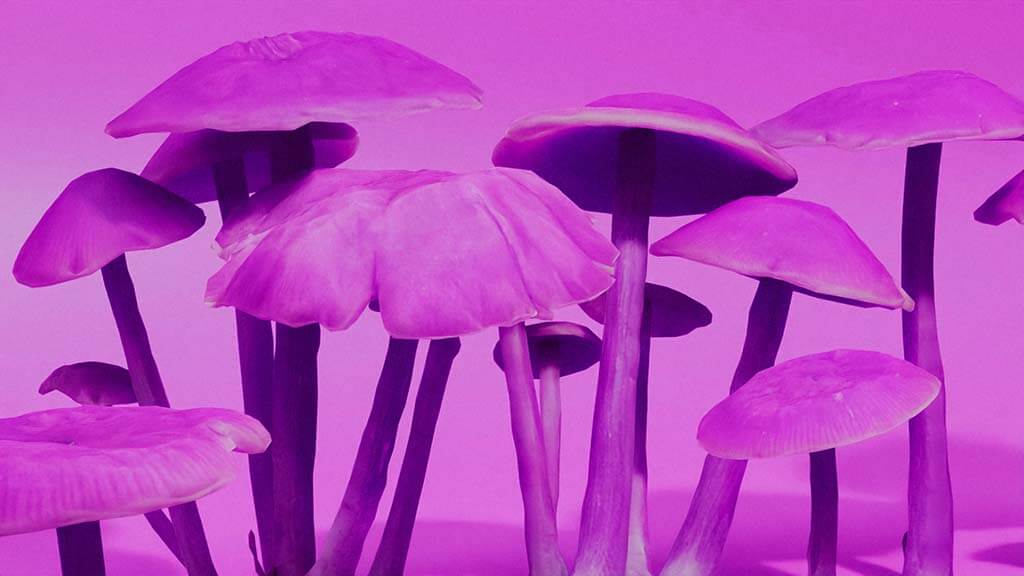
What about weed? How should you take it? There are countless ways to consume medical weed. For instance:
- Smoking joints
- Vaping
- Applying topicals
- Inserting suppositories
- Eating edibles
So, if you can do shrooms in one way, you can probably do weed the same. Well, apart from eating the bud, that would be scandalous.
Also, rarely do you need someone watching over you when consuming marijuana. Still, like shrooms, consuming weed in excess will likely lead to an unpleasant experience, so be cautious.
Shrooms: 0 Weed: 2
Microdosing psilocybin VS microdosing weed
Microdosing psilocybin involves taking small sub-perceptual doses of the psychedelic substance.
But how much is a microdose of mushrooms? Generally, a microdose of psilocybin can be anywhere from 0.1 to 0.5 grams of dried mushrooms. This low dose is not enough to trigger any intoxication or “trip.” But it can produce some subtle changes in perception and mood.
Microdosing psilocybin can have many benefits, for instance:
- increased creativity,
- improved focus,
- increased sense of well-being,
- and improved self-awareness.
However, it is worth noting that everyone reacts differently to psychedelics.
Microdosing weed is not a new phenomenon either. And for people who want to enjoy the benefits of marijuana without the psychoactive effects, microdosing weed can be a great option. By taking small doses of cannabis, typically around 2.5mg THC or less, people can experience relief from pain, anxiety, and other conditions without feeling high.
Shrooms: 0 Weed: 2
How long does a shroom high last?
How long a shroom high lasts depends on several factors, such as the type of mushroom, your weight and metabolism, and how you prepared the shrooms.
Generally, the effects of psilocybin mushrooms peak 1 to 2 hours after ingestion because of how quickly the liver metabolizes it. The total experience usually lasts between 4 and 6 hours. However, some people report feeling the effects for up to 12 hours. So, set aside plenty of time for the magic mushroom experience.
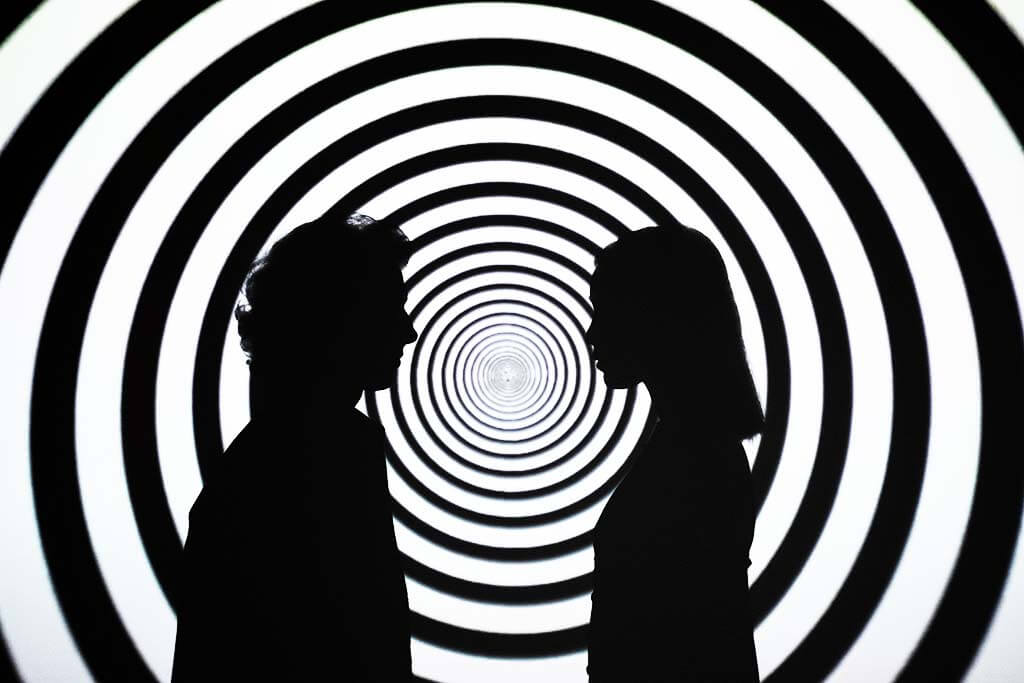
Similarly, many variables determine how long you are high on weed. Usually, you can expect it to last anywhere from 1 to 3 hours if you smoke. And, of course, the first few minutes are the most pronounced.
That said, do not worry if the effects begin to fade after a couple of hours. Most people find that they can still enjoy a pleasant afterglow afterward.
However, weed edibles are a different ballgame since the high is longer-lasting and more intense, around 6 to 8 hours. And dabbing can last for 2 to 4 hours. To clarify, these are just averages–some people may find that their high lasts shorter or longer than these estimates.
Find your ideal starting dose for cannabis edibles with our dosage calculator. Also, use our cannabutter ratio calculator to prepare infusions with accurate potency.
Since shrooms and weed induce non-identical experiences, there is no clear winner based on how long the high or “trip” lasts.
This one is a tie: Shrooms: 0 Weed: 2
Do shrooms show up in drug tests?
Shrooms can show up in a drug test. After all, federal law classifies psilocybin as a Schedule I substance. However, drug tests seldom investigate for traces of magic mushrooms.
Additionally, psilocybin metabolizes rather quickly. And it clears from the system in around 15 hours. Still, when it comes to drug testing, the detection of psilocybin depends on the method of investigation.
For instance, urine tests can detect the presence of psilocybin for up to 48 hours after consumption, while blood tests are only reliable for up to 24 hours. However, some urine tests are more sensitive than others, and shrooms may show several days after use. Hair samples may reveal traces for up to 90 days, but these tests are more expensive and rarer.
Weed, on the other hand, is a red flag! Generally speaking, drug tests can detect THC in urine for up to 30 days after last use, in hair for up to 90 days, and blood for up to 7 days.
So, in this respect, shrooms are the clear winner. Finally, a point!
Shrooms: 1 Weed: 2
Growing magic mushrooms VS growing weed
Anyone who has attempted growing magic mushrooms or weed understands that both can be challenging.
First are the climate requirements for each. Mushrooms need a cool, dark, and humid environment to thrive, while weed prefers a warm and sunny climate. Therefore, growing magic mushrooms is typically more challenging, as it can be difficult to create the right conditions indoors.
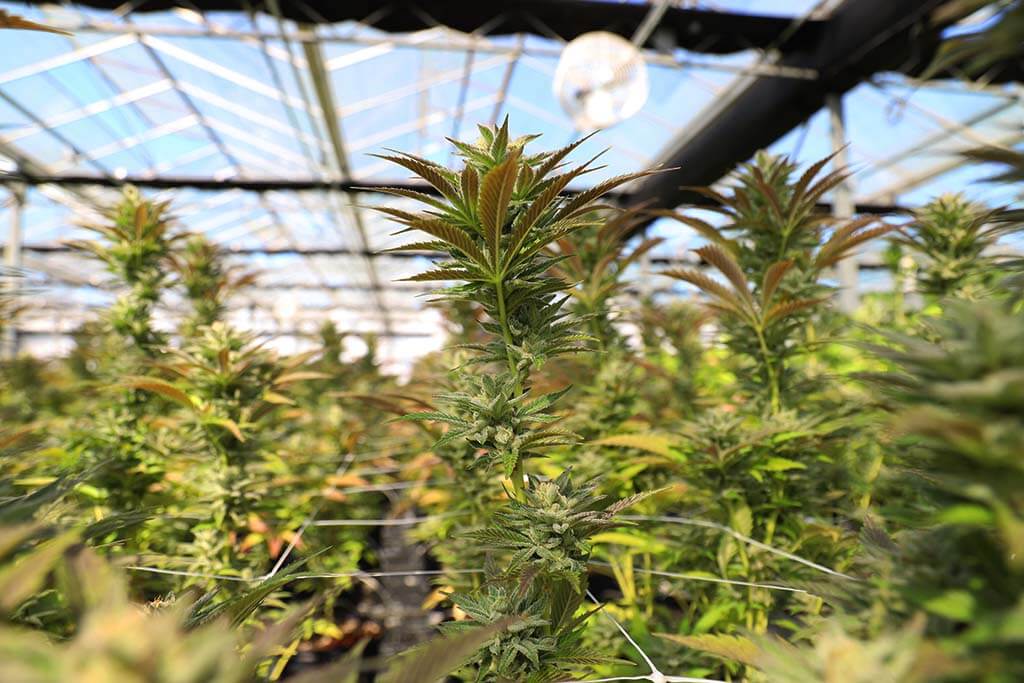
Additionally, shrooms require a substrate containing lots of nitrogen, such as cow poop. So, growing them can be a bit smellier than growing weed.
Still, growing mushrooms can be less labor-intensive than growing cannabis, as they do not need to be watered or fertilized as often.
Moreover, mushrooms typically have a shorter growing cycle than marijuana, meaning you can harvest them more quickly. As a result, you can realistically expect to harvest your crop within two months. In contrast, weed takes at least three months to mature.
Ultimately, deciding whether to grow shrooms or weed depends on your personal preferences and growing conditions.
While growing weed may be a bit easier, we’ll settle for a tie. You know, so this can be more of a contest.
Shrooms: 1 Weed: 2
Can you overdose or die on shrooms?
The answer is a resounding no! There has never been a case of someone dying from consuming shrooms, and overdosing on them is like herding cats.
Okay, perhaps it is technically possible to consume a lethal dose of magic mushrooms, but the likelihood of that happening is incredibly low. Magic mushrooms contain psilocybin and psilocin, which are non-toxic. Still, excessive consumption may lead to psychedelic mushroom poisoning symptoms.
Psychedelic mushroom poisoning symptoms
It usually occurs when a person ingests a magic mushroom. The most common symptoms of psychedelic mushroom poisoning include
- nausea,
- vomiting,
- diarrhea,
- abdominal cramps,
- paranoia,
- and headaches.
In more severe cases, symptoms may also include
- seizures,
- hallucinations,
- and psychosis.
Psychedelic mushroom poisoning is usually not fatal, but it can be dangerous if the person experiences severe symptoms or has an underlying health condition. The real danger is mistakenly ingesting poisonous mushrooms, which often look alike.
What about weed? Can you overdose or die from it? No, there is no known lethal dose of marijuana, and there is no record of anyone overdosing on it.
It is impossible to overdose on weed, as the amount of THC required to fatally overdose is far higher than any person could consume in a single sitting. And while it is technically impossible to overdose on weed, one should not be reckless.
Smoking too much weed can lead to unpleasant side effects such as paranoia and anxiety. And in rare cases, it can even cause psychotic episodes. So, while you can’t overdose on weed, it’s still important to use it responsibly.
Alas! Another tie!
Shrooms: 1 Weed: 2
Shrooms and alcohol VS alcohol and THC
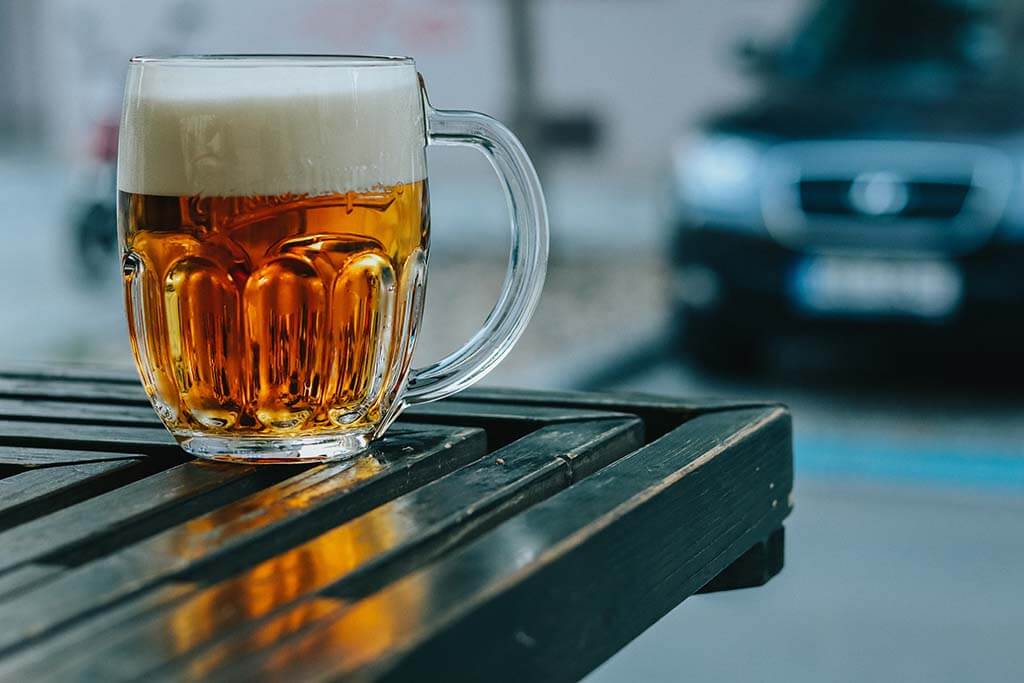
Shrooms and alcohol are a popular mix for those seeking an altered state of consciousness. Psilocybin is a powerful psychedelic that can cause intense hallucinations. Alcohol, on the other hand, is a depressant that slows down the nervous system.
When taken together, shrooms and alcohol can create a unique experience different from taking either substance alone. Some report feeling more relaxed and open to new ideas while under the influence of shrooms and alcohol. Others find that the combination amplifies the effects of both substances, leading to an overwhelming and potentially unpleasant experience.
Whatever the case, shrooms and alcohol are a potent combo that requires caution.
Similarly, alcohol and THC can amplify each other’s effects. For example, you may feel more drunk than usual if you drink alcohol after smoking marijuana. Alcohol can also make the effects of THC last longer, leading to an intense experience sometimes called a “cross-fade.”
But it is prudent to be careful when using alcohol plus THC. The combination can cause impaired judgment and make it difficult to control your behavior. As a result, you may be more likely to take risks or make poor decisions.
If you decide to use alcohol and THC together, do so with caution and in a safe environment.
Shrooms: 1 Weed: 2
A gram of shrooms VS a gram of weed
A gram of shrooms may seem meager, but it is enough to have a profound yet controlled experience, especially for beginners. If you are looking to push yourself further, however, then do not go beyond 1.5 grams.
A single gram can cost anywhere from $10 to $30, depending on where you buy it and the type of shroom.
The average cost of a gram of weed in the U.S. is $15. But prices can vary significantly depending on the quality of the weed, the location, and the dealer.
Can you feel a gram of weed? If you’re new to smoking weed, it’s unlikely that you’ll feel much from smoking a single gram. Depending on the THC content, most people require at least two to three grams to get high. However, tolerance levels vary from person to person, so some people may need more or less weed to achieve their desired effect.
Shrooms win this round!
Shrooms: 2 Weed: 2
Are shrooms legal in the U.S.?
Currently, shrooms are illegal in all U.S. states, save for Oregon, which became the first state to legalize psychedelic mushrooms on November 3rd, 2020. Besides Oregon, many cities nationwide such as Ann Abor, Denver, and Oakland, have decriminalized the trippy mushroom.
Furthermore, the Federal government has not been aggressively pursuing cases involving personal use of shrooms, and enforcement of this law is very lax. So, while we advocate for strict adherence to the law, it is unlikely that you could go to jail for shrooms.
Keyword: unlikely, not impossible!
Legal psychedelics
The Controlled Substance Act classifies almost all psychedelics, apart from Ketamine, as Schedule I substances. For example, Peyote (Mescaline) is a psychedelic that Native Americans have used for religious purposes for centuries, yet it is illegal. Similarly, Ayahuasca is not legal, yet it is a staple in shamanic rituals. Other illegal psychedelics include LSD (Lysergic acid diethylamide) and DMT (dimethyltryptamine).
Marijuana is still illegal in several states, despite an ongoing wave of legalization sweeping the country. Residents in states that approve the use of cannabis to treat specific conditions usually need a medical marijuana card. Getting a med card is easy since all it involves is getting the approval of a licensed MMJ doctor and then applying to the state program.
At Quick Med Cards, we take pride in helping our patients find relief from their ailments by connecting them with the most experienced and compassionate cannabis doctors. Additionally, we make the process fast and convenient by conducting most of our marijuana evaluations online via video call.
Arizona | Arkansas | Connecticut | Delaware | Hawaii | Iowa | Louisiana | Maine | Maryland | Michigan | Minnesota | Missouri | Montana | New Jersey | New Mexico | New York | North Dakota | Ohio | Oklahoma | Pennsylvania | Rhode Island | Texas | Virginia | West Virginia
Key Takeaways
- Shrooms contain psilocybin, a psychedelic compound that causes hallucinations.
- Shrooms and weed are popular recreational drugs with psychoactive effects. Additionally, they have a long history of use in traditional medicine and modern research on therapeutic benefits.
- Shrooms may alleviate headaches, depression, anxiety, and PTSD, plus aid in addiction treatment.
- Weed treats a wide range of conditions like ALS, chronic pain, epilepsy, glaucoma, and more.
- Shrooms and weed have low overdose risks but can cause unpleasant side effects if misused.
- Preference may depend on individual needs and experiences.
Verdict
This analysis on shrooms and weed should elicit a heated argument, especially between proponents of both drugs eager to make their case.
So, which is the better drug? In terms of health benefits, lower risks, and more tolerable side effects?
Well, based on my tally, there is no clear winner.
Honestly, shrooms versus weed is an unfair matchup since both have unique benefits and risks. But, if I’m taking sides, then it’s Mary Jane. Recent scientific research supports her therapeutic benefits. And the other drug seems better suited as pizza toppings–just like that, I exposed my bias.
What do you think?
More information about shrooms and weed
Below are answers to common questions about shrooms and weed.
How should I dose mushrooms? (Mushroom dosing)
Mushroom dosing or how many shrooms you take will determine the intensity of your experience. The right amount will depend on your body weight, tolerance, and the desired effect. For most people, 1-2 grams is a good starting dose. If you seek a more spiritual experience, you may want to take 3-4 grams. And if you are after a more intense trip, 5 grams or more may be necessary. Still, it is always better to start with a lower dose and increase as needed than to start with too much and then regret it afterward. Be sure to do your research and plan so that you can have a safe and enjoyable experience.
Mixing weed and shrooms–should I?
Shrooms and weed are both popular substances that people use for recreation. Shrooms tend to cause hallucinations, while weed induces feelings of relaxation. Some people mix shrooms and weed to get a more intense experience. But that can lead to adverse outcomes. For instance, shrooms can intensify the effects of weed and vice versa. So, be careful when you are mixing shrooms and weed.
Is marijuana a hallucinogen?
The short answer is, “we don’t really know.” Historically, cannabis counted as a hallucinogen, possibly due to the observation of its psychoactive effects. Today, however, the scientific consensus is that marijuana does not meet the criteria for a classic hallucinogen. While it can produce significant changes in perception and cognition, these effects are typically milder and less disruptive when compared to true hallucinogens like LSD or psilocybin mushrooms. So, while marijuana may not be a traditional hallucinogen, it certainly has the potential to induce powerful psychedelic experiences.
Can psychedelic mushrooms cause seizures?
Seizures are often associated with epilepsy but can also stem from other factors, including head injuries, drug use, and withdrawal from certain medications. Some researchers believe that psychedelic mushrooms may also be a potential trigger for seizures. One theory is that the psychoactive substances in mushrooms can alter brain activity and cause an imbalance in neurotransmitters, leading to seizure activity. In addition, people with underlying mental health conditions may be more likely to experience adverse reactions to psychedelic mushrooms. However, more research is needed to confirm this theory. For now, it’s best to err on the side of caution and avoid using psychedelic mushrooms if you have a history of seizures.
Do psychedelic mushrooms help with depression?
This question lingers in the minds of many people like scientists and those who battle depression alike. Depression is a complex disorder, and there is no one-size-fits-all solution. However, some studies have shown that psychedelic mushrooms may be an effective treatment for depression. These mushrooms contain compounds that can alter brain function and promote feelings of well-being and happiness. In addition, the experience of taking psychedelics can be profoundly positive and life-changing, helping to break the cycle of negative thinking often associated with depression. While more research is needed, there is evidence to suggest that psychedelic mushrooms could be a valuable tool in the fight against depression.
Can you smoke shrooms?
The answer, quite simply, is no. Smoking shrooms is not only ineffective, but it can also be dangerous. Shrooms are typically ingested orally, with the active compounds being absorbed through the digestive tract. When smoked, most of its components are lost in the fire, making it impossible to experience the desired effects. In addition, inhaling smoke can irritate the lungs and airways, potentially leading to respiratory problems. For these reasons, it is always best to consume shrooms differently.
What is the best way to eat shrooms?
When it comes to consuming shrooms, there are a few different options. For example, some people prefer to eat them raw, while others cook them first. Also, some opt for shroom edibles, such as chocolate bars or gummies. However, the consensus on the best way to eat shrooms is by making tea. Making psychedelic mushroom tea allows for the maximum extraction of the active compounds in the shrooms and makes them much easier to digest. Additionally, tea provides a pleasant way to consume shrooms and can be easily flavored to suit your tastes. So, if you’re looking for the best way to eat shrooms, brewing a cup of tea is the way to go.
Are shrooms addictive?
The answer to this question is not simple. While shrooms are not physically addictive, they can be psychologically addictive. People who use shrooms regularly may experience a strong need to keep using them to feel happy or fulfilled. They may also develop a tolerance and, as a result, may need to take increasingly larger doses to achieve the same results. As with any substance, there is always the potential for abuse and addiction. However, whether or not someone becomes addicted to shrooms is ultimately up to them.
Get Your Medical Marijuana Card
Same-day appointments available for online medical marijuana evaluation.
Get your certification now!
